Excerpts from Jim Conrad's
Naturalist Newsletter
from the November 22, 2009 Newsletter issued from Hacienda Chichen Resort beside Chichén Itzá Ruins, central Yucatán, MÉXICO; limestone bedrock, elevation ~39m (~128ft), ~N20.676°, ~W88.569°
RUDDY GROUND-DOVES
The other day I walked by a picnic table where the ground crew eats and a little ground-dove was beneath it, not ten feet away. She walked around pecking into the gravel as if my presence didn't bother her at all so I was able to get the neat shot shown below:
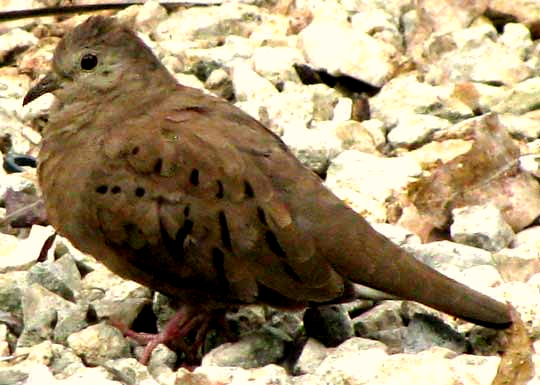
In this part of the Yucatan we have three ground-dove species -- the Common, the Blue and the Ruddy Ground-Doves. The picture shows a female Ruddy Ground-Dove, COLUMBINA TALPACOTI. The female, who needs to hide herself when she's nesting, wears a subdued plumage but the male has much brighter, rusty feathers, shown below:
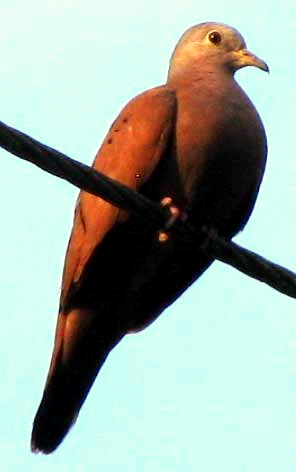
If you're unfamiliar with ground-doves, basically they're smaller editions of "regular doves," and more likely to be seen on the ground. North America's Mourning Dove is about 11 inches long (27 cm) while the Ruddy Ground-Dove is only some 7 inches (17 cm).
Ruddy Ground-Doves are found in towns, forest edges and clearings, mainly in humid areas, from Mexico to northern Argentina.
from the April 10, 2011 Newsletter issued from Hacienda Chichen Resort beside Chichén Itzá Ruins, central Yucatán, MÉXICO; limestone bedrock, elevation ~39m (~128ft), ~N20.676°, ~W88.569°
GROUND-DOVE PEACE DISRUPTED
So, two Ruddy Ground-Doves, Columbina talpacoti, were peaceably perched beside one another in the big, dry-season-leafless Cedro tree next to the Church, preening in early morning sunlight, as shown below:
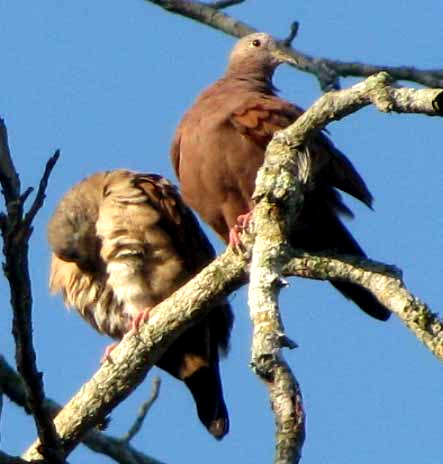
Lots of birds called that morning, but none more loudly, shrilly and sometimes downright nerve-gratingly than the little flocks of Social Flycatchers, Miozetetes similis, who drifted from tree to tree, nervously flitting up then landing again for no apparent reason, excitedly twittering and bickering, like hyperactive little kids -- behavior fairly normal for them. Two or three flycatchers landed in the ground-doves' big Cedro, the female ground-dove appeared to decide that the moment's tranquility had ended and flew away, but the male remained, preening, maybe in macho defiance.
More flycatchers arrived and some began darting at the male, apparently trying to drive him away. If one seemed about to dive, the ground-dove would spread his rufous wings defiantly in a high, broad V as shown below:
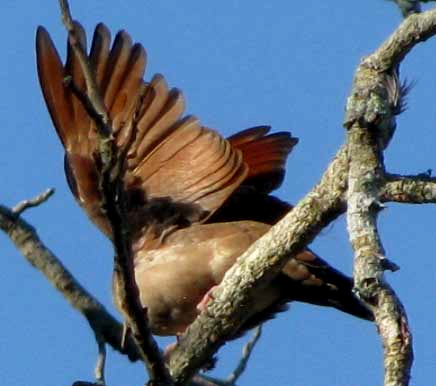
He'd hold his wings like that for five to ten seconds, looking around, and only when no one seemed about to attack would he put them down. Presumably the wing-spread defensive behavior makes the bird look larger and less vulnerable. But those flycatchers just wouldn't leave him alone. Again and again they'd dart near, first one on one side, then another from a different direction, and even a Boat-billed Flycatcher joined in. You can see a Boat-billed flying right at the poor male despite his wings being spread below:
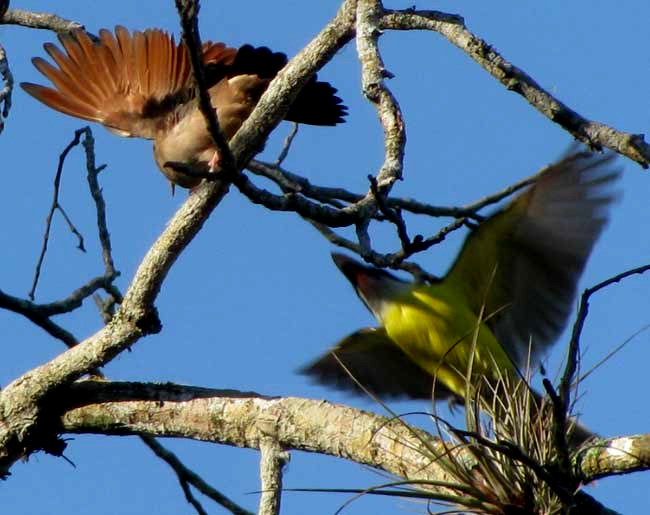
That attack is the one that drove the male away. It all happened so fast I couldn't decide whether actual contact was made, but you can see that the fast-moving flycatcher was well positioned for a blow.
Ground-doves feed mostly on the ground while flycatchers catch flying insects and eat small fruits and such so, really, the two species aren't competing for resources. Why would Nature produce a species like Social Flycatchers, then, who habitually go about, every day, loudly and shrilly antagonizing not only ground-doves but also many other species?
In human society we have the same thing, certain individuals and families habitually and inevitably -- even when there's no reason for it -- stirring things up, bringing confusion and disharmony wherever they go. I wonder: Could it be that in every complex, evolving system there must be, for some mysterious reason, a little random mischief and chaos? Maybe, among birds, humans and other social beings, some disruptive behavior is necessary for society's long-term maintenance.
Whatever the case, I felt sorry for the little ground-doves, who that morning seemed to want nothing more than to be left alone so they could preen together in the sunshine.